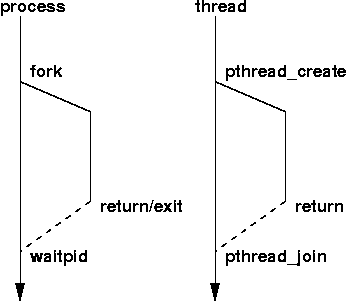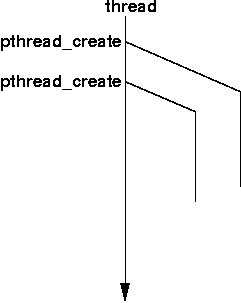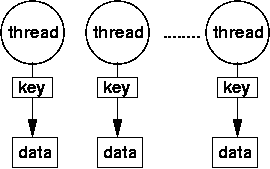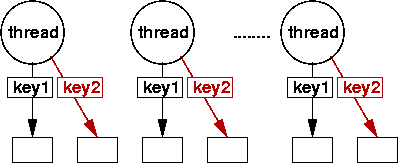
| COP4610: Operating Systems & Concurrent Programming | up ↑ |
These notes are intended only to provide a brief introduction to the POSIX threads API. They are not intended to fully duplicate the on-line manual pages. For detailed explanations of signals, handlers, and the operations that generate signals, use the Unix man command to view the on-line manual pages, or look in a book about the Unix API or threads. Links to some on-line tutorials on threads programming are given at the end of these notes.
A POSIX thread is a single flow of control within a process.
It shares a virtual address space with other threads in the same
process.
The following are per-thread attributes:
#define _REENTRANT #include <pthread.h> #include <sched.h>
_REENTRANT indicates that the reentrant (i.e. thread safe) versions of the standard libraries should be used.
The header file pthread.h defines the POSIX thread API.
The header file sched.h defines the process and thread scheduling API. Of the functions explained here, only sched_yield() requires it.
A subprogram is reentrant if it is safe for it to be called concurrently with another call to itself. It is important that all functions that are called by threads must be reentrant.
One of the things that can make a subprogram non-reentrant is for it to access the same memory that is accessed by another call to the same subprogram. Of course this could happen if the subprogram accesses parameters that are passed by reference, but we usually do not say that alone makes it non-reentrant, since it could be perfectly safe so long as the callers take care not to call it with the same arguments concurrently. On the other hand, if the subprogram accesses global variables or statically allocated local variables without any locking mechanism to protect them from concurrent accesses, it is not reentrant. For example, if a function written in the C language has local variables that are declared static chances are it is not reentrant.
For programs written in the C language, if the operating system supports threads, reentrant versions of the functions in the standard libraries are supposed to be provided. However, these functions are likely to to contain locking/unlocking code to protect shared variables, which adds some execution time overhead. So that programs that do not use multithreading do not pay this overhead, the system default may be to link in the non-reentrant libraries. To make sure the system uses the reentrant versions, the application should define the constant _REENTRANT before any #include directives. This directive will change the effects of the header files, through conditional compilation (#ifdef) directives embedded in the files.
#include <pthread.h>
int pthread_create(pthread_t *new_thread_ID,
const pthread_attr_t *attr,
void * (*start_func)(void *), void *arg);
To create a thread, you need to specify a place to store the ID of the new thread, the procedure that the thread should execute, optionally some thread creation attributes, and optionally an argument for the thread. The call returns a result code.
#include <pthread.h> int pthread_join(pthread_t target_thread, void **status);
By default, threads are created joinable. This means that some other thread is required to call pthread_join to collect a terminated thread, in a fashion similar to the requirement for a parent process to collect status for terminated child processes.

The use on threads of pthread_join() is similar to the use on processes of waitpid(). Details differ somewhat, but the main effect is for one thread to wait for (join with) the completion of another thread. The term "join" reflects the joining of control flows, as indicated in the diagram.

If you write a main program that does not use join to wait for its threads, when the main thread exits all the component threads will be aborted. They will just be interrupted and terminated.
A detached thread is not joinable. As soon as the thread terminates its resources may be recovered.
#include <pthread.h> int pthread_attr_init(pthread_attr_t *attr); int pthread_attr_destroy(pthread_attr_t *attr); ... int pthread_attr_setdetachstate(pthread_attr_t *attr, int detachstate); int pthread_attr_getdetachstate(const pthread_attr_t *attr, int *detachstate); int pthread_attr_setstacksize(pthread_attr_t *attr, size_t stacksize); int pthread_attr_getstacksize(const pthread_attr_t *attr, size_t *stacksize); ...
Certain attributes of a thread, including its priority and whether it is created joinable or detached, are specified via a parameter of type pthread_attr_t.
#include <pthread.h> #include <string.h> pthread_attr_t attr; pthread_attr_init (&attr); pthread_attr_setdetachstate (&attr, PTHREAD_CREATE_DETACHED); result = pthread_create (&server, &attr, thread_body, connfd); if (result) fprintf (stderr, "pthread_create: %s", strerror (result));
The thread operations generally do not use errno. Instead, they return the error code as the function value.
#include <pthread.h> pthread_t pthread_self(void);
This function can be called to get the ID of the currently executing thread. It is serves for threads the same purpose as getpid() serves for processes.
pthread_mutex_t M; pthread_mutex_lock (&M); ... critical section ... pthread_mutex_unlock (&M);
This example is simplified. It does not check for error codes.
A mutex is a memory-based data object that is used to implement mutual exclusion. The intent it so provide the kind of protection that is needed to implement a monitor. Mutexes are designed to provide the mutual needed for a monitor. They are designed to work with condition variables, which provide the rest of the monitor support.
On some systems mutexes are likely to only be supported for use between threads within a single process.
What happens if pthread_init() is called more than once on the same mutex?
The man-page, which is based on the POSIX standard, says that this "results in undefined behavior". This means that if you try to initialize a mutex more than once you are to blame for whatever happens. Your program might crash, in some unpredicatable way, or it might just reinitialize the mutex. If you make any assumptions about what happens, your code is certainly not portable.
#include <pthread.h> int pthread_mutex_init(pthread_mutex_t *mp, const pthread_mutexattr_t *attr); pthread_mutex_t mutex = PTHREAD_MUTEX_INITIALIZER; int pthread_mutex_lock(pthread_mutex_t *mp); int pthread_mutex_trylock(pthread_mutex_t *mp); int pthread_mutex_unlock(pthread_mutex_t *mp); int pthread_mutex_destroy(pthread_mutex_t *mp);
#include <pthread.h> int pthread_mutexattr_init(pthread_mutexattr_t *attr); int pthread_mutexattr_destroy(pthread_mutexattr_t *attr); int pthread_mutexattr_setpshared(pthread_mutexattr_t *attr, int process-shared); int pthread_mutexattr_getpshared(const pthread_mutexattr_t *attr, int *process-shared);
For mutex creation, like thread creation, one uses an attribute object to pass attributes of the mutex that is being created.
pthread_mutex_t M; pthread_mutexattr_t attr; pthread_mutexattr_init (&attr); pthread_mutex_init (&M, &attr);
This example is simplified. It does not check for error codes.
The tricky thing about CV's is that the POSIX standard intentionally leaves a lot of freedom to the implementor, so the CV functions can do different things on different systems. This means that a programmer must write code more carefully than usual, so that the code will work for all legal implementations of CV's.
The following are pseudo-code descriptions of some permissible implementations.
| pthread_cond_wait(&CV,&M) | pthread_cond_signal(&CV) |
|---|---|
| pthread_mutex_unlock(&M); sched_yield(); pthread_mutex_lock(&M); |
(do nothing) |
| pthread_mutex_unlock(&M); CV.enqueue (This_Thread); This_Thread.sleep; pthread_mutex_lock(&M); |
T = CV.dequeue_one; T.wakeup; |
| pthread_mutex_unlock(&M); CV.enqueue (This_thread); This_thread.sleep; pthread_mutex_lock(&M); |
while (CV.queue_nonempty) { T = CV.dequeue_one; T.wakeup; } |
The main thing about pthread_cond_wait is that it must release the mutex, give other threads a chance to lock (and then unlock) the mutex, and then relock the mutex.
Whether the thread goes to sleep during the interval in which the mutex is unlocked is up to the implementation.
The main thing about pthread_cond_signal is that if any threads are sleeping on the CV, at least one of them will wake up, lock the mutex, and recheck the logical condition.
Whether it wakes up one thread or all the threads that are waiting on the CV is upt to the implementation.
pthread_cond_t C; pthread_mutex_t M; int State = 0;
Waiter:
pthread_mutex_lock (&M); while (! (State || pthread_cond_wait (&C, &M))); pthread_mutex_unlock (&M);
Signaler:
pthread_mutex_lock (&M); State = 1; pthread_cond_signal (&C); pthread_mutex_unlock (&M);
Condition variables are generally only supported for use between threads within a single process.
Condition variables can only be used with a mutex.
#include <pthread.h> int pthread_cond_init(pthread_cond_t *cond, const pthread_condattr_t *attr); int pthread_cond_wait(pthread_cond_t *cond, pthread_mutex_t *mutex); int pthread_cond_timedwait(pthread_cond_t *cond, pthread_mutex_t *mutex, const struct timespec *abstime); int pthread_cond_signal(pthread_cond_t *cond); int pthread_cond_broadcast(pthread_cond_t *cond); int pthread_cond_destroy(pthread_cond_t *cond);
#include <sched.h> int sched_yield (void)
Calling this function invokes the scheduler, which may switch execution to another thread.
#include <pthread.h>
pthread_once_t once_control = PTHREAD_ONCE_INIT;
int pthread_once(pthread_once_t *once_control, void
(*init_routine, void)););
There are situations where a thread may need to initialize some global data, but it cannot tell in advance whether another thread might already have initialized the same data. It may be unsafe to initialize something more than once. For example, the Solaris man-page for pthread_mutex_init() says:
Attempting to initialize an already initialized mutex results in undefined behavior.
That makes sense. For example, what would happen if we reinitialize a mutex that is already locked and may already have some threads blocked on it?
To see what happens, take a look at program examples/threads/init_bad.c, in directory examples/threads. Better, compile it and execute it.
void initialize () {
static int init_flag = 0; /* is initialized to 0 at process start time */
if (! init_flag) {
/* window for race between threads is here
if two threads fetch the value 0 before one increments init_flag,
both will execute the initialization code, and if that happens
there may be a problem
*/
init_flag++;
pthread_mutex_init (&M, NULL);a
}
pthread_mutex_lock (&M);
/* now initialize other global data, under protection of the mutex */
pthread_mutex_unock (&M);
}
This solution tries to use a static flag variable to prevent multiple initializations.
As the comments in the code above indicate, this is not 100% safe. It is possible (though unlikely) that two threads might fetch the value of init_flag concurrently and both find the value to be zero, in which case pthread_mutex_init() would be called twice on the same mutex. Things that can go wrong but usually don't are the worst nightmare of concurrent programmers, because when they do go wrong the error is very hard to track down. For this reason, a good concurrent programmer would not be satisfied with the above "solution".
There is a special thread API function to solve this problem, pthread_once. It can be used as follows, to solve our mutex initialization problem.
void init_routine () {
pthread_mutex_init (&M, NULL);
}
void initialize () {
static pthread_once_t init_flag = PTHREAD_ONCE_INIT;
/* is initialized at process start time */
pthread_once (&init_flag, init_routine);
pthread_mutex_lock (&M);
/* now initialize other global data, under protection of the mutex */
pthread_mutex_unock (&M);
}
Note that the idea is basically the same as our first attempt. The variable init_flag is used to indicate whether the initialization has been done yet. The difference is that the function pthread_once is guaranteed to atomically test and modify the flag.
For complete examples of both solutions, see files examples/threads/init_weak.c and examples/threads/init_good.c.
#include <pthread.h> int ptread_getconcurrency(void);int pthread_setconcurrency(int new_level);
The Solaris man page for pthread_setconcurrency() says:
Unbound threads in a process may or may not be required to
be simultaneously active. By default, the threads implemen-
tation ensures that a sufficient number of threads are
active so that the process can continue to make progress.
While this conserves system resources, it may not produce
the most effective level of concurrency.
The pthread_setconcurrency() function allows an application
to inform the threads implementation of its desired con-
currency level, new_level. The actual level of concurrency
provided by the implementation as a result of this function
call is unspecified.
An application should specify a concurrency level higher than one if it expects the threads of a process to make use of more than one physical processor of an SMP system.
#include <pthread.h> int pthread_key_create(pthread_key_t *key, void (*destr_function)(void *)); int pthread_key_delete(pthread_key_t key); int pthread_setspecific(pthread_key_t key, const void *pointer); void * pthread_getspecific(pthread_key_t key);
See the complete example program in perthread.c in examples/threads.
These functions provide a mechanism for a library function to retrieve thread-specific data. The example program cited above shows how they can be used.
This feature amounts a database, in which the identity of the current thread (implicit) and another data value (of type pthread_key_t) can be used as keys to store and retrieve a pointer value. It is intended for the implementors of thread-safe libraries, to keep data that must be different for each thread. (For example, consider the global variable errno.) Different libraries may install different keys, and so each have their own private thread-specific data.
pthread_key_t new_key; pthread_key_create (&new_key, my_destructor_function));
p = (perthread_data_ptr) malloc (sizeof (struct perthread_data)); ... initialize data fields of struct pointed to by p ... pthread_setspecific (my_key, (void *) p));
perthread_data_ptr mine = pthread_getspecific (my_key);

The figure shows how the key is like a tag on a reference from the thread to the user-provided thread-specific object, which is implemented by pthread_set/getspecific().

The shows how using different keys allows different libraries to each associate their own thread-specific data with each thread, without interfering with one another.
You can find a full listing of all the pthread operations by using the Unix command "apropos pthread". For example, you may get the following output:
[baker@websrv processes]$ apropos pthread pthread_atfork (3thr) - register handlers to be called at fork(2) time pthread_attr_destroy [pthread_attr_init] (3thr) - thread creation attributes pthread_attr_getdetachstate [pthread_attr_init] (3thr) - thread creation attributes pthread_attr_getinheritsched [pthread_attr_init] (3thr) - thread creation attributes pthread_attr_getschedparam [pthread_attr_init] (3thr) - thread creation attributes pthread_attr_getschedpolicy [pthread_attr_init] (3thr) - thread creation attributes pthread_attr_getscope [pthread_attr_init] (3thr) - thread creation attributes pthread_attr_init (3thr) - thread creation attributes pthread_attr_setdetachstate [pthread_attr_init] (3thr) - thread creation attributes pthread_attr_setinheritsched [pthread_attr_init] (3thr) - thread creation attributes pthread_attr_setschedparam [pthread_attr_init] (3thr) - thread creation attributes pthread_attr_setschedpolicy [pthread_attr_init] (3thr) - thread creation attributes pthread_attr_setscope [pthread_attr_init] (3thr) - thread creation attributes pthread_cancel (3thr) - thread cancellation pthread_cleanup_pop [pthread_cleanup_push] (3thr) - install and remove cleanup handlers pthread_cleanup_pop_restore_np [pthread_cleanup_push] (3thr) - install and remove cleanup handlers pthread_cleanup_push (3thr) - install and remove cleanup handlers pthread_cleanup_push_defer_np [pthread_cleanup_push] (3thr) - install and remove cleanup handlers pthread_cond_broadcast [pthread_cond_init] (3thr) - operations on conditions pthread_cond_destroy [pthread_cond_init] (3thr) - operations on conditions pthread_cond_init (3thr) - operations on conditions pthread_cond_signal [pthread_cond_init] (3thr) - operations on conditions pthread_cond_timedwait [pthread_cond_init] (3thr) - operations on conditions pthread_cond_wait [pthread_cond_init] (3thr) - operations on conditions pthread_condattr_destroy [pthread_condattr_init] (3thr) - condition creation attributes pthread_condattr_init (3thr) - condition creation attributes pthread_create (3thr) - create a new thread pthread_detach (3thr) - put a running thread in the detached state pthread_equal (3thr) - compare two thread identifiers pthread_exit (3thr) - terminate the calling thread pthread_getschedparam [pthread_setschedparam] (3thr) - control thread scheduling parameters pthread_getspecific [pthread_key_create] (3thr) - management of thread-specific data pthread_join (3thr) - wait for termination of another thread pthread_key_create (3thr) - management of thread-specific data pthread_key_delete [pthread_key_create] (3thr) - management of thread-specific data pthread_kill [pthread_sigmask] (3thr) - handling of signals in threads pthread_kill_other_threads_np (3thr) - terminate all threads in program except calling thread pthread_mutex_destroy [pthread_mutex_init] (3thr) - operations on mutexes pthread_mutex_init (3thr) - operations on mutexes pthread_mutex_lock [pthread_mutex_init] (3thr) - operations on mutexes pthread_mutex_trylock [pthread_mutex_init] (3thr) - operations on mutexes pthread_mutex_unlock [pthread_mutex_init] (3thr) - operations on mutexes pthread_mutexattr_destroy [pthread_mutexattr_init] (3thr) - mutex creation attributes pthread_mutexattr_getkind_np [pthread_mutexattr_init] (3thr) - mutex creation attributes pthread_mutexattr_init (3thr) - mutex creation attributes pthread_mutexattr_setkind_np [pthread_mutexattr_init] (3thr) - mutex creation attributes pthread_once (3thr) - once-only initialization pthread_self (3thr) - return identifier of current thread pthread_setcancelstate [pthread_cancel] (3thr) - thread cancellation pthread_setcanceltype [pthread_cancel] (3thr) - thread cancellation pthread_setschedparam (3thr) - control thread scheduling parameters pthread_setspecific [pthread_key_create] (3thr) - management of thread-specific data pthread_sigmask (3thr) - handling of signals in threads pthread_testcancel [pthread_cancel] (3thr) - thread cancellation sigwait [pthread_sigmask] (3thr) - handling of signals in threads
For this course, you do not need to learn to use all of these functions, so they are not explained here. If you want to read more about them you can use the man command to read the on-line manual pages about them.
To link a program using POSIX threads you may need to specify the POSIX threads library, via the compilation/linkage parameter -lpthread.
To link a program using the sched_yield() function on Solaris you may need to specify the real-time library, via the compilation/linkage parameter -lrt.
To avoid forgetting to include such linkage directives when you compile programs it is helpful to construct a makefile and specify the inclusion of -lpthread as part of a default compilation rule.
When you program with threads, be especially wary of the following:
volatile int X;" tells compiler not to optimize away load
or store operations:X:=1; ... Y:= X; ... X:= 0; versus ... Y:= 1;
... X:= 0;Compilers try to "optimize" the code they generate, to make it run faster. Some of these optimizations are not correct if the code contains references to shared variables, which might be accessed concurrently by other threads. For example, suppose the source code of a program contains a loop like the following:
X = 1; while (X);while (1);
Observe that this kind of code might be used to implement a "busy wait" operation, where the current thread is waiting for another thread to change the value of X to 0.
Test-compiling this code with no optimizations using the gcc compiler with no optimizations we obtain the following Intel x86 assembly language output:
movl $1, X
.p2align 2
.L3:
cmpl $0, X
jne .L3
Observe that his code has the desired effect, since the value of X is re-fetched every time around the loop.
Test-compiling this code using the gcc compiler with optimization -O2 we obtain the following assembly language output:
movl $1, X
movl $1, %eax
.p2align 2
.L5:
testl %eax, %eax
jne .L5
Observe that in this second version the value of X has been loaded into a register eax, which cannot change during the loop. Thus, the code does not have the desired effect.
The problem is that the compiler writer reasoned that the variable X was "loop invariant". That is, its value would not change during the loop. That would ordinarily be correct in a single-threaded application. It is only wrong because we are accessing the variable X from more than one thread.
When a programmer plans to access a variable from more than one thread it is the programmer's responsibility to tell the compiler about this, using the attribute volatile.
With the variable X declared volatile and optimization level -02 we get the following:
movl $1, X
.p2align 2
.L5:
movl X, %eax
testl %eax, %eax
jne .L5
Observe that this code works as originally intended.
At the time this was written, if you looked for tutorials on POSIX threads with a Web search engine you would quickly find several good ones, including the two mentioned above.
| T. P. Baker. ($Id) |